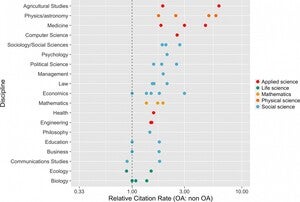Open access has well-documented benefits to the dissemination of research, thereby speeding up the process of science from abstract research to real-world applications. While exact estimates can vary, a large body of research suggests that open access articles are cited more often and more quickly than articles published in traditional formats. In the health sciences, this is particularly important, as the translation of science from lab research to clinical applications has the potential to improve human health and well-being, and even to save lives. Open access publishing helps break down the barriers to research dissemination and access, thereby improving the chain of communication that connects researchers to health care workers on the front lines. Indeed, medical researchers have long known that there is a disconnect between research and practice, and billions of dollars are wasted globally every year on research that fails to effectively translate into medical policy and practice. When medical research is involved, the pitfalls of traditional scholarly publishing are not just an issue for researchers, because they also affect governments, health care workers, and the health of the public at large.

Image source: https://doi.org/10.7554/eLife.16800.002
This is even more apparent during the COVID-19 pandemic, as the biomedical research community quickly realized that the traditional pace of science was too slow for fighting a rapidly developing global pandemic. There is a need for fast, effective research, and for that research to be disseminated as widely as possible, so that it could quickly be used to inform policy and clinical practice. This is especially true given the global nature of the pandemic. The limitations placed on accessing information in traditional journals particularly impacts developing nations and disadvantaged regions, who were also hit particularly hard by the pandemic. Providing open information access to everyone at the same time helps achieve equity and contributes to the global success of pandemic control measures.

Preprints are a form of “green” open access, where researchers put early (but completed) versions of their manuscripts in online repositories ahead of peer review and formal publication in traditional academic journals, allowing the research to be accessed much more quickly. Medical researchers quickly capitalized on this form of publishing in the wake of COVID-19. Indeed, according to a recent study, around 25% of the COVID-19 articles published in the first ten months of the pandemic were first published as preprints. The benefits of publishing preprints are also clear from the study: nearly 30% of the preprints were reported in news articles, and 52 of 81 policy documents reviewed in the study cited preprints. The traditional, often glacial, pace of academic research dissemination never could have supported the rapid need for COVID-19 information at a global scale, and the use of preprints continues to be an invaluable tool in the ongoing fight against the COVID-19 pandemic.
While some have rightfully criticized the lack of peer review for preprints to potentially cause negative outcomes, such instances have been minimal and swiftly corrected. Indeed, the open nature not only of the articles themselves but also of their criticism is one of the benefits of open access publishing. In fact, according to the Retraction Watch database, at the time of writing, of the 138 articles related to COVID-19 that have been retracted, only 22 are preprints. Bad science can happen anywhere, regardless of the publishing venue, and all researchers need to be vigilant and use their own judgment before acting on any information, especially in the health sciences.
Throughout the COVID-19 pandemic, the limitations of traditional scholarly publishing models, and the benefits of open access publishing, have been made clear, especially when lives are at stake. If you are interested in learning more about open access publishing, take a look at our Open Access Library Guide, or contact the Researcher Support Team!